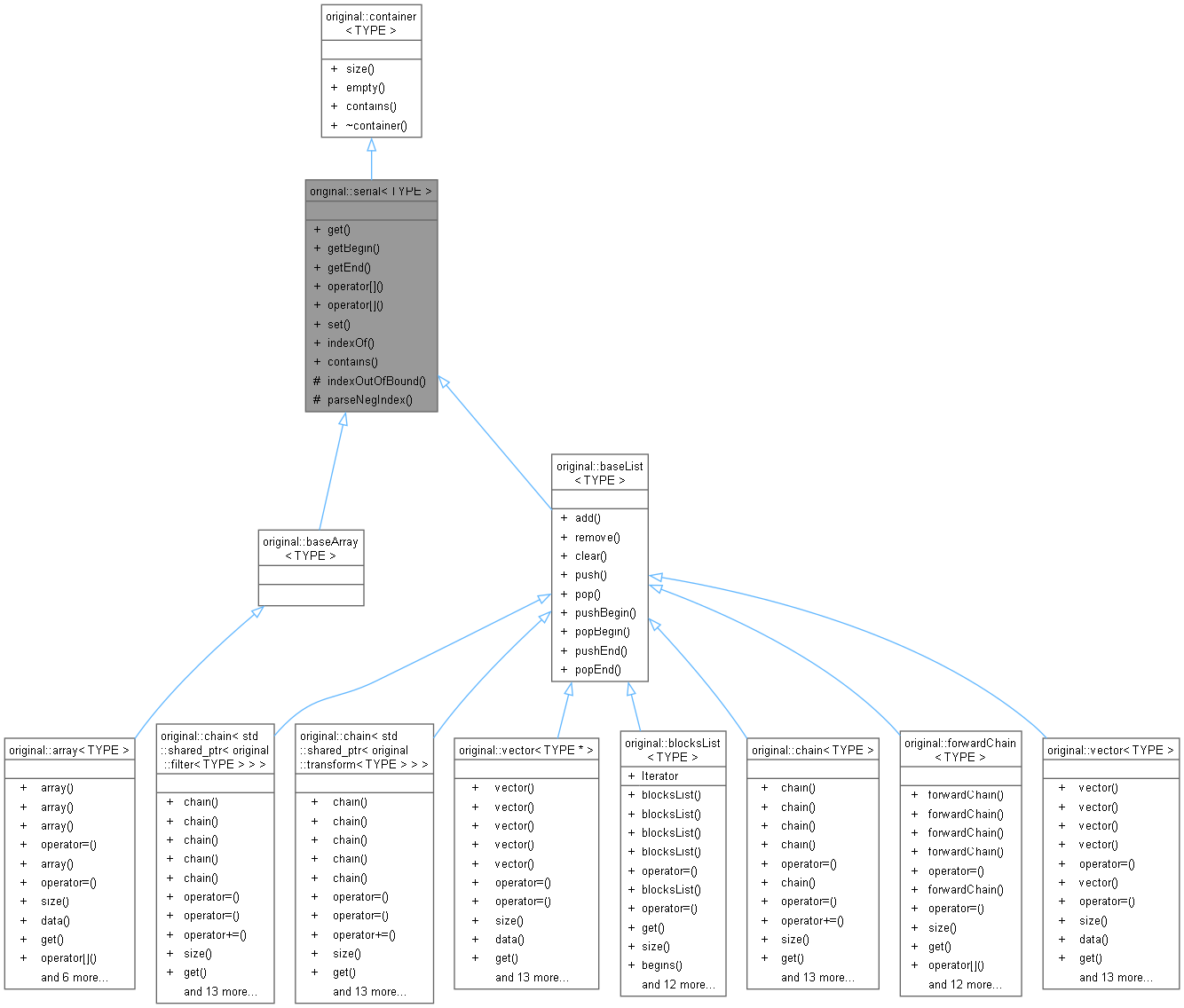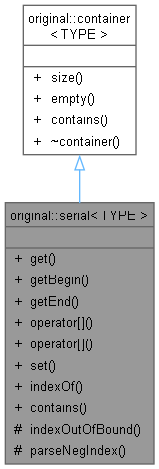Abstract base class for sequential containers with index-based access. More...
#include <serial.h>


Public Member Functions | |
| virtual TYPE | get (integer index) const =0 |
| Retrieves the element at the specified index. | |
| virtual TYPE | getBegin () const |
| Retrieves the first element in the container. | |
| virtual TYPE | getEnd () const |
| Retrieves the last element in the container. | |
| virtual TYPE | operator[] (integer index) const |
| Retrieves the element at the specified index (const version). | |
| virtual TYPE & | operator[] (integer index)=0 |
| Retrieves or sets the element at the specified index. | |
| virtual void | set (integer index, const TYPE &e)=0 |
| Sets the element at the specified index. | |
| virtual u_integer | indexOf (const TYPE &e) const =0 |
| Finds the index of the specified element. | |
| bool | contains (const TYPE &e) const override |
| Checks if the container contains the specified element. | |
 Public Member Functions inherited from original::container< TYPE, ALLOC > Public Member Functions inherited from original::container< TYPE, ALLOC > | |
| virtual u_integer | size () const =0 |
| Gets the number of elements in the container. | |
| bool | empty () const |
| Checks if the container is empty. | |
| virtual | ~container ()=default |
| Destructor for the container class. | |
Protected Member Functions | |
| bool | indexOutOfBound (integer index) const |
| Checks if the provided index is out of bounds. | |
| integer | parseNegIndex (integer index) const |
| Converts negative indices into valid positive indices. | |
 Protected Member Functions inherited from original::container< TYPE, ALLOC > Protected Member Functions inherited from original::container< TYPE, ALLOC > | |
| container (ALLOC alloc=ALLOC{}) | |
| Constructs a container with specified allocator. | |
| TYPE * | allocate (u_integer size) |
| Allocates raw memory for elements. | |
| void | deallocate (TYPE *ptr, u_integer size) |
| Deallocates memory previously allocated by allocate() | |
| template<typename O_TYPE, typename... Args> | |
| void | construct (O_TYPE *o_ptr, Args &&... args) |
| Constructs an element in-place. | |
| template<typename O_TYPE> | |
| void | destroy (O_TYPE *o_ptr) |
| Destroys an element. | |
Additional Inherited Members | |
 Protected Attributes inherited from original::container< TYPE, ALLOC > Protected Attributes inherited from original::container< TYPE, ALLOC > | |
| ALLOC | allocator |
| The allocator instance used for memory management. | |
Detailed Description
class original::serial< TYPE, ALLOC >
Abstract base class for sequential containers with index-based access.
- Template Parameters
-
TYPE Type of the elements contained in the serial container ALLOC Allocator type for memory management (default: depends on derived class)
Defines common interface for containers that support index-based access to their elements. It provides methods for element retrieval, bounds checking, and negative index handling. Derived classes must implement get(), operator[], set(), and indexOf() methods.
The allocator is inherited from the base container class and is propagated to derived classes for consistent memory management. The ALLOC type must meet the C++ allocator requirements.
Member Function Documentation
◆ contains()
|
overridevirtual |
Checks if the container contains the specified element.
- Parameters
-
e The element to check for.
- Returns
trueif the container contains the element, otherwisefalse.
This method uses indexOf() by default to check if the element exists within the container.
Implements original::container< TYPE, ALLOC >.
◆ get()
|
pure virtual |
Retrieves the element at the specified index.
- Parameters
-
index The index of the element.
- Returns
- The element at the given index.
Derived classes must implement this method to provide the actual element retrieval.
Implemented in original::array< TYPE, ALLOC >, original::array< underlying_type, rebind_alloc_underlying >, original::bitSet< ALLOC >, original::blocksList< TYPE, ALLOC >, original::blocksList< TYPE, allocator< TYPE > >, original::chain< TYPE, ALLOC >, original::chain< opts >, original::chain< original::strongPtr< original::filter< TYPE > > >, original::chain< original::strongPtr< original::transform< TYPE > > >, original::chain< TYPE, allocator< TYPE > >, original::forwardChain< TYPE, ALLOC >, original::vector< TYPE, ALLOC >, original::vector< hashNode *, rebind_alloc_pointer >, original::vector< hashNode *, rebind_alloc_pointer >, original::vector< original::hashTable::hashNode *, rebind_alloc_pointer >, original::vector< original::skipList::skipListNode * >, and original::vector< TYPE * >.
◆ getBegin()
|
virtual |
Retrieves the first element in the container.
- Returns
- The first element in the container.
This method provides a shortcut to get the first element by calling get(0).
◆ getEnd()
|
virtual |
Retrieves the last element in the container.
- Returns
- The last element in the container.
This method provides a shortcut to get the last element by calling get(-1).
◆ indexOf()
|
pure virtual |
Finds the index of the specified element.
- Parameters
-
e The element to find.
- Returns
- The index of the element, or
size()if not found.
This method searches for the element in the container and returns its index.
Implemented in original::array< TYPE, ALLOC >, original::array< underlying_type, rebind_alloc_underlying >, original::blocksList< TYPE, ALLOC >, original::blocksList< TYPE, allocator< TYPE > >, original::chain< TYPE, ALLOC >, original::chain< opts >, original::chain< original::strongPtr< original::filter< TYPE > > >, original::chain< original::strongPtr< original::transform< TYPE > > >, original::chain< TYPE, allocator< TYPE > >, original::forwardChain< TYPE, ALLOC >, original::vector< TYPE, ALLOC >, original::vector< hashNode *, rebind_alloc_pointer >, original::vector< original::hashTable::hashNode *, rebind_alloc_pointer >, original::vector< original::skipList::skipListNode * >, and original::vector< TYPE * >.
◆ indexOutOfBound()
|
nodiscardprotected |
Checks if the provided index is out of bounds.
- Parameters
-
index The index to check.
- Returns
trueif the index is out of bounds, otherwisefalse.
This method accounts for negative indices by converting them to positive indices before performing the bounds check.
◆ operator[]() [1/2]
|
virtual |
Retrieves the element at the specified index (const version).
- Parameters
-
index The index of the element.
- Returns
- Reference/copy of the element at the given index.
The non-const version allows direct modification of elements in allocator-managed storage. The const version returns a copy of the element.
- Exceptions
-
May throw original::outOfBoundError exceptions for invalid indices
◆ operator[]() [2/2]
|
pure virtual |
Retrieves or sets the element at the specified index.
- Parameters
-
index The index of the element.
- Returns
- Reference/copy of the element at the given index.
The non-const version allows direct modification of elements in allocator-managed storage. The const version returns a copy of the element.
- Exceptions
-
May throw original::outOfBoundError exceptions for invalid indices
Implemented in original::array< TYPE, ALLOC >, original::array< underlying_type, rebind_alloc_underlying >, original::bitSet< ALLOC >, original::blocksList< TYPE, ALLOC >, original::blocksList< TYPE, allocator< TYPE > >, original::chain< TYPE, ALLOC >, original::chain< opts >, original::chain< original::strongPtr< original::filter< TYPE > > >, original::chain< original::strongPtr< original::transform< TYPE > > >, original::chain< TYPE, allocator< TYPE > >, original::forwardChain< TYPE, ALLOC >, original::vector< TYPE, ALLOC >, original::vector< hashNode *, rebind_alloc_pointer >, original::vector< hashNode *, rebind_alloc_pointer >, original::vector< original::hashTable::hashNode *, rebind_alloc_pointer >, original::vector< original::skipList::skipListNode * >, and original::vector< TYPE * >.
◆ parseNegIndex()
|
nodiscardprotected |
Converts negative indices into valid positive indices.
- Parameters
-
index The index to convert.
- Returns
- The corresponding positive index for negative indices, otherwise returns the original index.
For example, if the index is -1, it will be converted to the last element's index.
◆ set()
|
pure virtual |
Sets the element at the specified index.
- Parameters
-
index The index of the element to set. e The new value to store at the specified index.
- Postcondition
- get(index) == e
Implemented in original::array< TYPE, ALLOC >, original::array< underlying_type, rebind_alloc_underlying >, original::blocksList< TYPE, ALLOC >, original::blocksList< TYPE, allocator< TYPE > >, original::chain< TYPE, ALLOC >, original::chain< opts >, original::chain< original::strongPtr< original::filter< TYPE > > >, original::chain< original::strongPtr< original::transform< TYPE > > >, original::chain< TYPE, allocator< TYPE > >, original::forwardChain< TYPE, ALLOC >, original::vector< TYPE, ALLOC >, original::vector< hashNode *, rebind_alloc_pointer >, original::vector< original::hashTable::hashNode *, rebind_alloc_pointer >, original::vector< original::skipList::skipListNode * >, and original::vector< TYPE * >.
The documentation for this class was generated from the following file:
- src/core/serial.h
Generated by